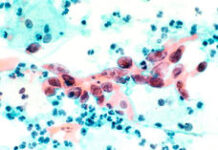, by Daryl McGrath
NCI’s collection of cancer information products is constantly growing, so periodically we provide updates on new and updated content of interest to the cancer community.
W. Kimryn Rathmell Begins Work as 17th Director of the National Cancer Institute
On December 18, W. Kimryn Rathmell, M.D., Ph.D., began work as the 17th director of the National Cancer Institute. A renowned kidney cancer expert and influential leader in cancer research and patient care, Dr. Rathmell was selected by President Biden to succeed Monica M. Bertagnolli, M.D., who became director of the National Institutes of Health on November 9.
Appreciation for Dr. Worta McCaskill-Stevens
In November, the cancer community mourned the passing of Worta McCaskill-Stevens, M.D., a medical oncologist, former director of the NCI Community Oncology Research Program (NCORP), and champion for the inclusion of racial and ethnic minority groups and underserved communities in clinical trials as both participants and researchers. At the 2023 NCORP annual meeting in August, then–NCI Director Monica Bertagnolli, M.D., announced the creation of the NCI Worta McCaskill-Stevens Career Development Award for Community Oncology and Prevention Research (K12).
News Release: NCI Researchers Develop Approach that Could Help Supercharge T-Cell Therapies against Solid Tumors
Researchers at NCI’s Center for Cancer Research (CCR) have developed a way to potentially increase the effectiveness of T cell–based immunotherapy treatments, such as CAR T-cell therapy, against solid tumors. CCR researchers engineered T cells (CAR T cells and another form of cellular immunotherapy called TCR T cells) to carry cytokines, which are proteins that can boost T-cell function. T cells modified to carry a pair of cytokines killed far more cancer cells than T cells carrying just one of these cytokines or neither of them.
News Release: Immunotherapy Pioneer Steven Rosenberg Awarded Nation’s Highest Honor for Technology and Innovation
On October 24, President Biden awarded immunotherapy pioneer Steven Rosenberg, M.D., Ph.D., the National Medal of Technology and Innovation. It is the nation’s highest honor for technological achievement. Dr. Rosenberg is chief of the Surgery Branch in NCI’s Center for Cancer Research.
DCTD pipeline news
The October edition of pipeline news, produced quarterly by NCI’s Division of Cancer Treatment and Diagnosis (DCTD), features news about the NCI-60 cell lines screen and the NCI Clinical Trials Network biobanks; a staff spotlight; and updates about diversity, equity, inclusion, and accessibility activities.
NCI Imaging Community Webinar Series
NCI’s Cancer Imaging Program hosts a monthly webinar series that showcases current research directions in cancer imaging and stimulates interdisciplinary dialog on selected cancer imaging topics. The newly updated webinar page lists future topics and links to archived videos of past webinars. The next webinar, on January 8, will address interoperative molecular imaging of lung cancer.
Data Science Training Resources
NCI’s Center for Biomedical Informatics and Information Technology (CBIIT) recently launched a new training section on their website to help researchers learn about cancer data science, including collecting, visualizing, and sharing data.
40 Years of Cancer Epigenetics Symposium
Epigenetics refers to the study of how age and environmental factors, such as diet, exercise, drugs, and chemicals, may modify DNA in ways that change gene activity without altering the gene sequence. On October 20, NCI’s Division of Cancer Biology held a symposium to commemorate the 40th anniversary of pivotal discoveries that launched the field of cancer epigenetics. The symposium webpage links to a videocast of the event and related documents.
Inside Cancer Careers Podcast
The NCI Center for Cancer Training’s (CCT) bimonthly Inside Cancer Careers podcast features trainees and established investigators talking about their career journeys. Recent episodes include Voices for Equity: Conversations on Cancer Health Disparities, in which Brian Rivers, Ph.D., of the Morehouse School of Medicine, and Tiffany Wallace, Ph.D., of NCI’s Center for Cancer Health Disparities, discussed the importance of research on cancer health disparities, and an Exclusive Episode: Working Together to Break Through with Tyler Jacks, Ph.D., of the Massachusetts Institute of Technology, who talked about tackling historically difficult problems in cancer.
Transition Career Development Workshop
The CCT Cancer Training Branch is holding its inaugural Transition Career Development Workshop on January 16 and 17. The virtual workshop is intended to help current NCI career development awardees and prospective applicants better understand the elements involved in transitioning to becoming independent researchers. There is no cost to attend the meeting, but registration is required.
Annual Symposium on Global Cancer Research
The NCI Center for Global Health’s (CGH) 12th Annual Symposium on Global Cancer Research will be held May 6 to May 9 with the theme, “Collaborating for Impact.” The call for sessions, abstracts, and nominations for the 2024 Rachel Pearline Award is open from January 8 to February 18. The center recently led several scientific sessions at the 2023 African Organization for Research and Training in Cancer (AORTIC) International Conference in Dakar, Senegal, November 2 through 6. The conference included NCI-led sessions on tobacco control, cancer health disparities, HIV-associated malignancies, hepatobiliary cancers, and esophageal cancer and a keynote address by CGH Director Satish Gopal, M.D., M.P.H.
Cancer Prevention Science Blog
The NCI Division of Cancer Prevention’s Cancer Prevention Science blog reports on cancer prevention and related topics. Recent stories from the blog include:
• Ways to Reduce and Avoid Side Effects of Medications for Breast Cancer Risk Reduction
• How Western-Style Diet, Aging, May Impact Cancer Risk in Intestinal Cells
• Repurposing Common Medications to Prevent Cancer
• Rapid Growth and Progress in Cardio-Oncology Research
From Inquiry to Impact: FY2023 DCCPS Overview and Highlights
The NCI Division of Cancer Control and Population Sciences (DCCPS) Overview and Highlights report outlines the division’s recent accomplishments, including the 50th anniversary of the Surveillance, Epidemiology, and End Results (SEER) Program—the nation’s premier source for cancer statistics—and progress made toward advancing six key future directions for research DCCPS had identified and unveiled in 2022: health equity, data strategies, evidence-based cancer control policy research, digital health interventions, modifiable risk factors, and climate change.
New and Updated Patient and Consumer Content
- Cancer Fatigue explains the causes of cancer fatigue and what you can do to manage it.
- Stem Cell Transplants in Cancer Treatment provides a comprehensive description of this form of treatment, including the types of cancer treated with blood stem cell transplants, how these procedures work against cancer, and their common side effects.
- Donating Blood Stem Cells for Stem Cell Transplants explains how blood stem cells are collected, the risks involved in donating, and how to become a donor.
- Cancer in Children and Adolescents provides current statistics about cancer in children and teens in the United States and discusses the types, causes, and treatment of these cancers.
- Menopausal Hormone Therapy and Cancer has been updated with the results of recent research. It includes information about the health effects of menopausal hormone therapies and the benefits and risks of using them.
- How to Relax Your Mind and Body describes different mind/body techniques and exercises that many people with cancer and their caregivers have found to help lower stress and cope with anxiety.
New Drug Information Summaries
Several new pages have been added to NCI’s collection of summaries of drugs approved by the Food and Drug Administration to treat different types of cancer.
- Repotrectinib (Augtyro) is approved to treat non-small cell lung cancer that has spread and has an abnormal version of a protein called ROS1.
- Toripalimab-tpzi (Loqtorzi) has been approved to treat nasopharyngeal carcinoma, a type of head and neck cancer, that has spread, come back, and cannot be removed with surgery.
- Fruquintinib (Fruzaqla) is approved to treat colorectal cancer that has spread to other parts of the body.
- Talquetamab-tgvs (Talvey) has been approved to treat multiple myeloma that has come back or did not respond to treatment.






